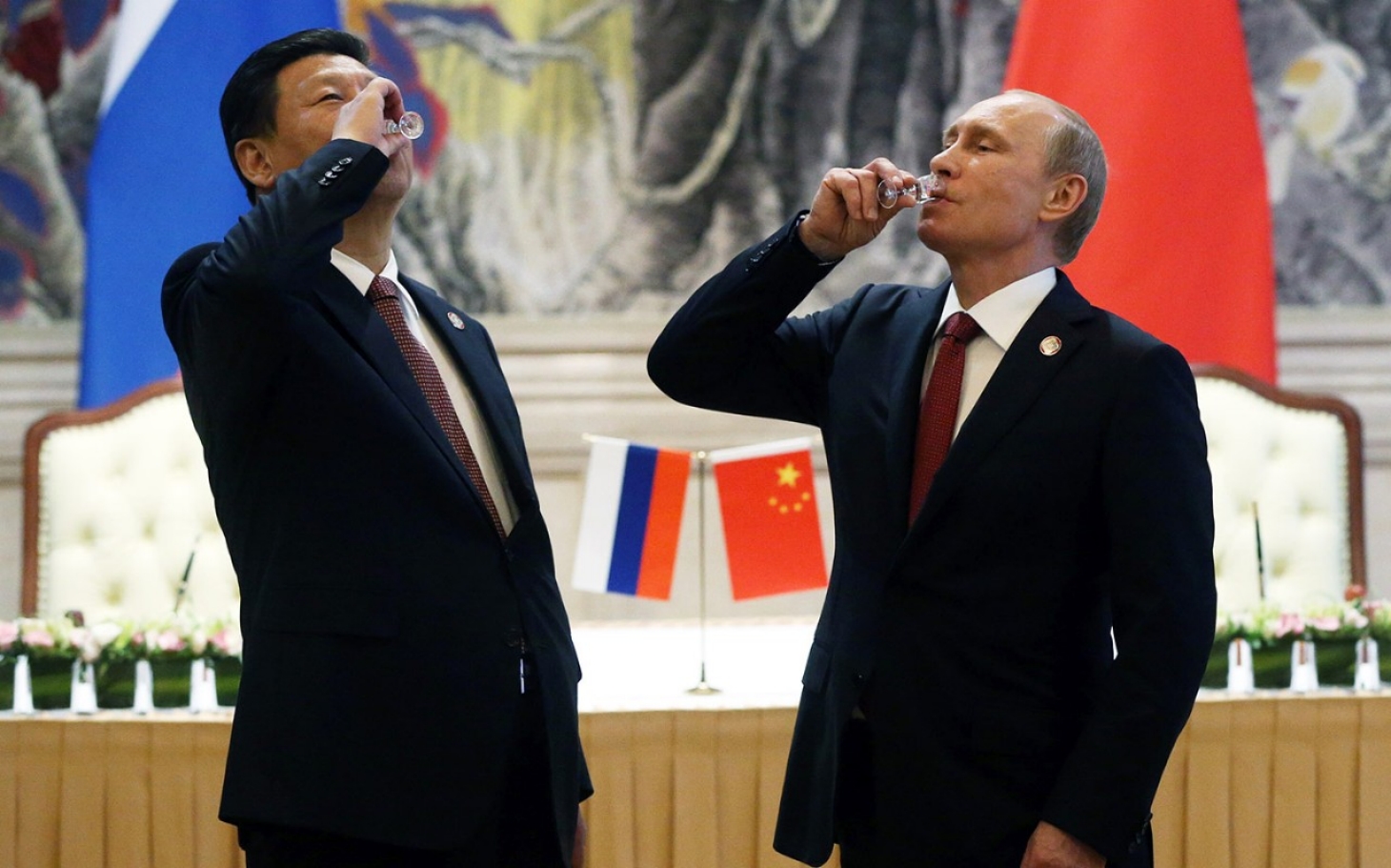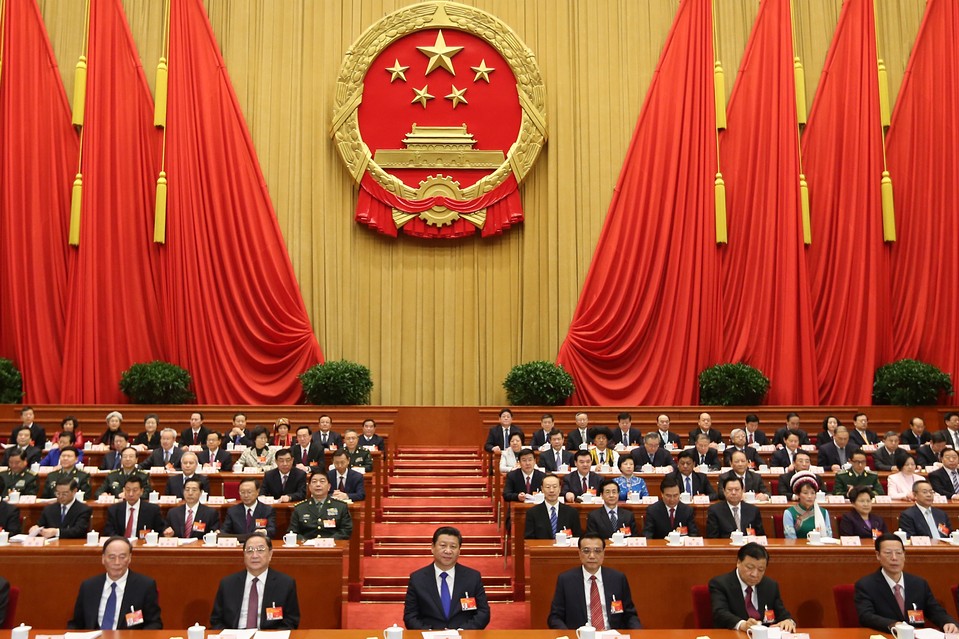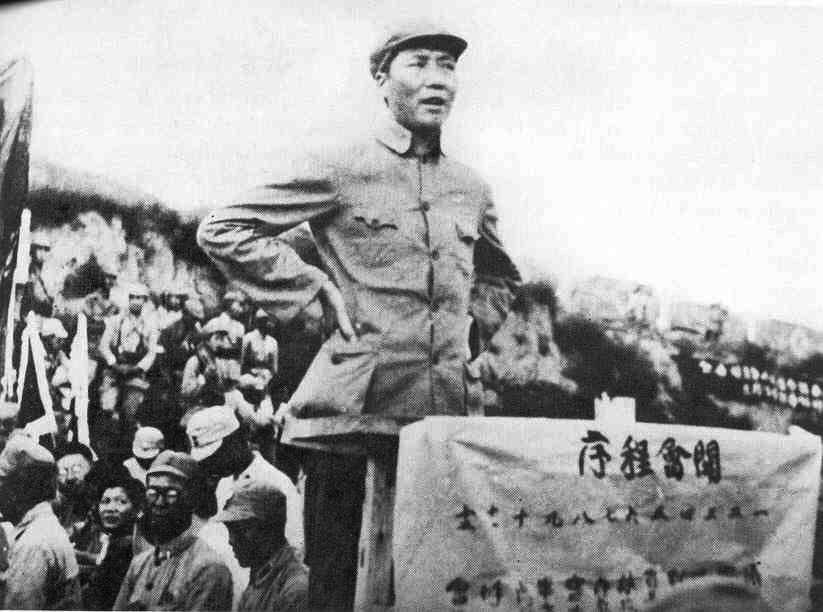
 Back Together and Better than Ever: Renewed Sino-Russian Relations
Back Together and Better than Ever: Renewed Sino-Russian RelationsAccording to a Pew Global Study, conducted in July 2017, "Russians are positively inclined toward China, with seven-in-ten expressing favorable views of their neighbor...the second-most positive opinion of China." This affinity appears to be a mutual one, as China and Russia have been warming their relations in recent years. Red tourism has been on the rise, with the two countries recently coming up with a joint program to implement such tours. The program entails that "experts from the two countries meet to discuss the development of 'red tours,' those taking visitors to the sites of early communist activities." Further, the countries are strengthening their economic ties, as China is preparing to receive 50% more oil from Russia.
Above all, the United States has served as the single rallying cause for the two powerhouse nations. Recently, both Russia and China pushed back against President Trump's rhetoric during his statement made during the "leaders week" of the 72nd Session of the United Nations General Assembly. Russian Foreign Minister Lavrov noted "the process of creating a polycentric world order is an objective trend...This is something that everyone will need to adapt to, including those who are used to lording it over others." China's Foreign Minister Wang Yi noted "we live in an era that's defined by a deepening trend toward a multipolar world..that is witnessing profound changes in the international landscape and balance of power."
This comes at a time when both Russia and China seek to develop their economies and gain a stronger geopolitical and ideological foothold around the globe, ahead of the United States. The two countries also seem to be engaging in an overt quid-quo-pro relationship, as China has recently announced that it is willing to step in and assist in reconstruction efforts in Syria. The two have shown their joint commitment towards enlarging their respective economies in a similar fashion, as recently seen at the BRICS Summit. The Summit saw the the Group seek to expand its sphere of influence, calling for action amongst the "BRICS Plus" countries.
Further, both countries are home to entities which face a number of harsh unilateral sanctions from the US, notably those related to North Korea. In addition to facing their own set of sanctions, the two countries also oppose tougher economic sanctions against North Korea and are nearing their red lines in this regard. North Korea Watcher Andrei Lankov noted that both China and Russia oppose sanctions which go beyond the scope of existing ones. They fear that if sanctions become crippling enough, it may lead to an economic crisis in North Korea and that this could lead to a regime collapse, or a serious disturbance, which would then become an immediate issue right on China's border. As such, both countries support a "dual freeze" solution, whereby the United States and South Korea halt their joint military exercises, and North Korea halts its nuclear program.
In response to the US' actions, as well as its threats to use force against North Korea, most recently this past week at the United Nations, China and Russia have sought to send a clear message to Trump that such actions are untenable. This came partly in the form of joint military exercises in between Peter the Great Bay and the southern part of the Sea of Okhotsk. David Axe, from the Daily Beast, posits that Trump's rhetoric and the exercises "were not unrelated. The more Trump escalates his rhetorical assault on North Korea, the more Russia and China—the world powers with the strongest ties to Pyongyang—have countered with veiled threats of their own directed at the United States and its allies." This follows the large scale joint military exercises that China and Russia conducted earlier in the summer in the Baltic Sea. These exercises were largely seen as having intended to send a statement to NATO countries, though the two countries conducting the exercises insisted that they were only "a matter of routine."
China and Russia will undoubtedly continue to strengthen their bilateral relations, as they look to make up a bigger share of the global economic and geopolitical pie.
 Beijing's Tightrope Act: Shaping Society and Economics through Technology
Beijing's Tightrope Act: Shaping Society and Economics through TechnologyBeijing is seeking to reshape national values using technology to enforce 'pro-social' behavior, while asserting its international dominance as a tech powerhouse. So far, China has walked this "tightrope" like a skilled acrobat, quickly becoming a leader in the industries of tomorrow, while keeping stability and control over its massive population. However, this dynamic may be proving to be more fraught than perhaps anticipated. A recent ban on Initial Coin Offerings serves as case and point.
Prior to the crackdown, China stood as a leading force in Bitcoin trading and FinTech innovation -- a position frequently lauded by national papers and spokespeople. But, earlier this month, the Ministry of Industry and Information Technology decided that the risks outweighed potential global benefits. While there has been little impact on the bitcoin market writ large, it seems that only China risks falling behind. On September 14, China's largest Bitcoin exchange 'BTC China' announced that it would stop trading by the end of the month. A week later, China issued a travel ban on bitcoin executives while it conducts its sweeping reforms.
The New York Times writes that "China has sought to walk a tightrope when it comes to Bitcoin and similar virtual currencies. Whereas the currencies provide the country with a chance to develop new and emerging technologies, officials also worry that they would allow Chinese consumers to get around tough restrictions on how much money they can send overseas and allow them to be used to launder money."
But this 'tightrope walk' is not limited to cryptocurrency. A broader tension between both advancing and controlling/regulating cutting-edge technology has created a challenging dynamic between government, technology, and society in China. On one hand, China is rapidly shaping society through measures like facial recognition to enforce laws and even pay for items at restaurants. Similarly, its much-touted plan to be the foremost Artificial Intelligence producer by 2030 promises to have massive societal – and global – ramifications. But the more that China invests in emerging technologies as a means of reaching its domestic and international goals, the more it struggles to restrict them for their unintended purposes.
In response to China's ICO ban, Finnish economists issued a report which concluded that "bitcoin technology can't be controlled." Other experts have said similar things about China's tech darlings. Elon Musk has pointed to AI as the greatest threat to society and global peace. On a lighter – but nonetheless alarming – note, people are turning to plastic surgery as a means to escape facial recognition technology.
In China, revolutionary technologies have not always had the impact predicted, as in the case of the Internet. ICOs, AI, and the disruptive innovations of tomorrow will continue to test China's ability to progress, while maintaining internal harmony.
 Catching Up on the Most Important General Assembly This Fall: The 19th Party Congress
Catching Up on the Most Important General Assembly This Fall: The 19th Party CongressAs the UN General Assembly convened in New York City this week, one of the "most vocal defenders of globalization and talks with North Korea is sitting out one of the world's biggest gatherings devoted to them," wrote the LA Times on the eve of the forum. Why? Xi Jinping has bigger fish to fry.
There has been a flurry of coverage from Beijing in the run-up to the 19th Party Congress, which is set to take place October and promises to set the tone for at least the next five years. While the upcoming congress will not be a full-fledged transition of power, as Xi Jinping, Li Keqiang, and the majority of the Politburo Standing Committee will remain in power, some analysts are looking to patterns in leadership reshuffling in the lead-up to the congress to reveal the CCP's sixth generation of leaders.
On Monday, the CCP announced plans to revise its constitution at the 19th Party Congress. Most believe that Xi Jinping's political theories will be a blueprint for the amended charter. By Friday, a senior government researcher revealed that China would push fiscal reforms that could boost revenues for local governments after the Congress, coming on the heels of the S&P Global Ratings downgrade of China's long-term sovereign credit rating. Also on Friday, Chinese corruption watchdog, Wang Qishan, announced tentative plans to step down from the Communist Party despite opposition from President Xi Jinping. At 69 years old, he is one year past the customary retirement age. However, Xi has emphasized that this is not a "hard and fast rule", leading many to question whether he is setting the precedent for a third term.
Further, analysts forecasted this week that China's largest-ever turnover of military elite could take place during this cycle. Says Brookings Institution Director Cheng Li, "Xi Jinping's bold, years-long campaign against corruption has already reached high into the ranks of the military elite—purging "tigers" like Guo Boxiong and Xu Caihou, both former vice chairmen of the Central Military Commission (CMC)—which perhaps points to the sweeping scale of change that is underway."
As tightly-controlled announcements are released, Beijing continues to ensure domestic stability by shortening the reins on its populace. Last week, the government shut down multiple news and entertainment programs until after the Congress has concluded. Regardless of the precautionary steps Beijing takes, many, like the European business lobby, are hoping that "new leadership to emerge from China's Communist Party meeting will show a commitment to market opening" and hopefully another prosperous 5 years.
 This Week in Chinese HistoryOn September 21, 1949, Chinese Communist leaders proclaimed the People's Republic of China. At the opening of the Chinese People's Political Consultative Conference in Peking, Mao Zedong announced that the new government would be, "under the leadership of the Communist Party of China." He also outlined the various committees and agencies that would govern the new Communist state, setting forth the structure of the modern Chinese administration.
This Week in Chinese HistoryOn September 21, 1949, Chinese Communist leaders proclaimed the People's Republic of China. At the opening of the Chinese People's Political Consultative Conference in Peking, Mao Zedong announced that the new government would be, "under the leadership of the Communist Party of China." He also outlined the various committees and agencies that would govern the new Communist state, setting forth the structure of the modern Chinese administration.
Prepared by China-US Focus editorial teams in Hong Kong and New York, this weekly newsletter offers you snap shots of latest trends and developments emerging from China every week, while adding a dose of historical perspective.
- 2017-09-15 China positions itself to dominate the industries of the future
- 2017-09-08 Did North Korea just test a hydrogen bomb?
- 2017-09-01 Are Forced Technology Transfers Forcing the U.S. and China to Rethink How They Do Business?
- 2017-08-25 Bannon Out: What now for the China-US relationship?
- 2017-08-18 Trump Launches “Investigation on Whether to Investigate” China’s IP Laws
- 2017-08-11 Threats of "Fire and Fury" on the Korean Peninsula
- 2017-08-04 Trump Administration Plans Trade Actions Against China
- 2017-07-28 Xi to Dominate the 19th CPC Congress
- 2017-07-21 A Steely Comprehensive Economic Dialogue
- 2017-07-14 South China Sea Arbitral Award after One Year
- 2017-07-07 Now is the Trump Honeymoon with China Over?
- 2017-06-30 China Passes New Intelligence Law
- 2017-06-23 The End of China’s Honeymoon with Trump & Diplomatic and Security Dialogue
- 2017-06-16 Climate Change and Reliable Data Dealt Blows
- 2017-06-09 India, Pakistan formally welcomed into the Shanghai Cooperation Organization
- 2017-06-02 Once Partners in Fighting Climate Change, Trump Retreats, China Stays Steady on Paris Climate Accord
- 2017-05-26 Chinese Missile Frigates Confronts USS Dewey as U.S. Resumes FON Operations in South China Sea
- 2017-05-19 The Belt and Road Forum Concludes Leaving Behind Mixed Reactions
- 2017-05-12 Beijing, Washington Reach First Trade Deal Under 100-day Plan
- 2017-05-05 Degree of Autonomy Decaying in Hong Kong?